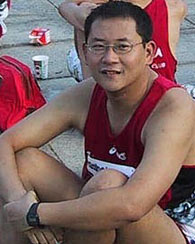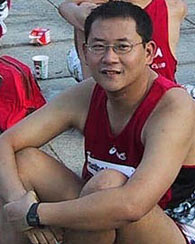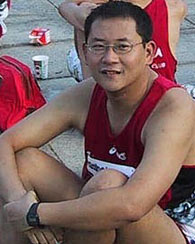Meet Kelvin Wong who is also the founder of a gay sports group, Adventurers Like Us and a gay Buddhist group, Heartland.

æ: When did you realise you were gay? What was the process like?
kelvin: I guess that most of us realise that we may be homosexual from relatively young age. It's just that at that time, we don't have much information about and are not able to name this difference.
For me, I know that I have a different preference from young. Before puberty, it's just this liking to be close to male friends (older ones in general) whom I like. As puberty hits, this evolved to sexual awareness and attraction. This new awareness was attractive, yet confusing. You find yourself not interesting the girl subjects which most of your male class mates are talking about and at the same time you have this crushes on male school mates that you cannot and don't know if its right to talk about.
The only source of information is from the library. I would secretly hide in one corner in the library to read about materials on homosexuality. The information I got did not help me to deal with it as most of these were from books about growing up and family.
The only real life information I know is from talks about transvestite and/or effeminate men. This made me feel even more confused and lonely. For one, I don't behave like an effeminate person; neither do I have any desires to be a woman! I certainly did not want to become like "one of them" nor labelled as such! Lonely, because I thought that I was the only person in the world who is facing this problem. Needless to say, years and years later, I met up with some of my gay schoolmates!
Although these feelings were there, they took a back seat during the rest of my school life, army and working life. Of course, I did have mutual sex experiences with one of my army mates and another person before I started working. All the time, I never considered myself as a gay person, relegating that term to drag queens and effeminate men. The lack of information and gay friends did not help.
At about 24, I started to do some soul searching. It's a basic search for your own future, identity, personality and spirit. At the end of it, 3 years later, I have decided that I will have to be firm about how I feel about things and was prepared to stake my world with it. I came out to a gay classmate of mine, whom I had heard about from the grape vines. The strange thing about feelings is that once you have accepted it, you start to be aware of people with similar feelings around you and on the streets.
Then came the Internet and the rest, as they say, is history...
æ: Are you out to family and friends? If yes, could you tell us something about it? Is it an important factor in your life?

One of the main reason why I want to come out to people I care about is honesty. There other is to stop them from bugging me with the "when are you getting married?" questions. It has been very effective, I must say.
æ: What's your favourite CD?
kelvin: I don't have favourite CD, but there is one song that I like very much. Its from Faye Wong, called "Human World" (or Ren2 Chien1). The song reminds people to be practical in love, not to be stuck in the romantic notion about love and to take things easy, something that I find many people, especially gay people, are unable to follow.
In the song, it reminds us that we cannot expect things to be always beautiful and everlasting. It also reminds us that it is not the end of the world to be lonely or to feel pain. To grow, we cannot avoid pain (sometimes). We cannot expect to see smiling faces all the time. Neither can we expect that our tears will move people all the time. The world is bigger than we think and the possibilities and opportunities are endless.
æ: What kind of pet do you have? Why?
kelvin: I used to have a dog, but my sister gave it away when we moved. If I could, I would choose to have a dog again. I guess dogs give us a sense of being wanted unconditionally. A dog doesn't care what you look like or how you treat it sometimes. It always forgets it and gives you unconditional attention and just loves being with you. It's there when you are sad and it's there when you are happy. The same cannot be said for human beings.
Kelvin's Community
æ: Do you work with/support any gay or lesbian community groups? How?
kelvin: I started out by organizing simple luncheons and cycling trips to Pulau Ubin. This slowly graduated to the forming of ADLUS, Adventurers Like Us, a sports group for gays and lesbians. It's a mailing list that hopes to connect people interesting in sporting and adventurous activities to bond and carry activities together. We have organized night cycling trips, wakeboarding, scuba diving and hiking trips so far.
The other is the gay Buddhist group called Heartland. Its is also based on a mailing list that hopes to bring together gay people who are interested in Buddhism and to help each other (Buddhist) to deepen our understand of it and to propagate it.
æ: What do you think we need most in Asia's gay and lesbian community?

Visibility is also important in our social and religious circles.
Coming out to people around us is also a way of gaining visibility and, hopefully, to break the stereotype. People who know friends who are gay or who have relatives who are gay are more likely to be supportive of the some gay issues. Of course, religious affiliation does play an important part in that acceptance.
Because of the lack of exposure to the gay community, religious organizations in Singapore can be very homophobic. This is mainly due to stereotyping, fear, ignorance and failure to understand the issue properly. By being more visible within the religious organizations, we can help them to understand this issue of homosexuality better. With better understand and exposure, they may be less judgmental in confronting the issue and relating it to their belief system. This is, of course, an ideal. Looking into the West, we can see the extreme positions already taken. Nevertheless, visibility is still important.
æ: What advice would you give to someone who is trying to come to terms with his or her sexuality?
kelvin: First of all, be honest with yourself. This is the most important part of being yourself. If you are not honest with yourself, who else can you be honest with? A lot of people that I have met think that they hide themselves so well that no one will question about them or think that they are gay. This is self-denial. People do notice and question and with the population being more "gay aware", it does not take long to put 1 and 1 together to get 2. And from my point of view, they are as obvious as an ostrich sticking its head in the sand.
A lot of people like to cover up by trying to act "straight" with their colleagues, friends and family. This will make it for difficult to them to accept you should you decide to come out to them. We must have the courage to stand our grounds and not be pressurized to be like "one of the boys". If you are caring and kind person, why make yourself a rude and obnoxious jock?
